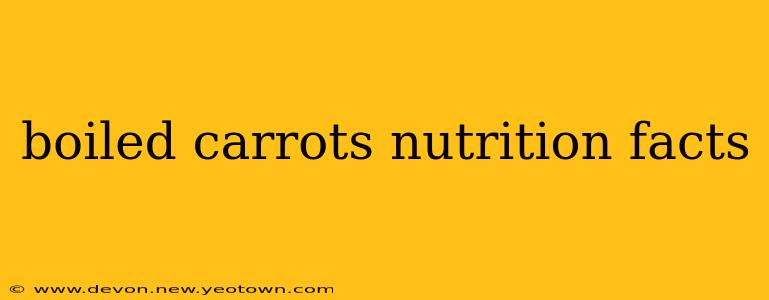Carrots, a humble vegetable readily available worldwide, offer a surprising wealth of nutrients. But how do these nutritional benefits change when we boil them? Let's delve into the nutritional facts of boiled carrots and discover why this simple preparation method retains much of their goodness.
Imagine this: a steaming pot, the sweet aroma of carrots filling your kitchen, a simple side dish ready to complement your meal. This isn't just a culinary scene; it's a nutritional powerhouse waiting to be unleashed. Boiled carrots, far from being a bland side, offer a concentrated dose of vitamins, minerals, and antioxidants, all while retaining much of their original nutritional profile.
What are the Nutritional Benefits of Boiled Carrots?
Boiled carrots retain a significant portion of their vitamins and minerals. While some nutrients might leach into the water during boiling (more on that later!), a well-prepared serving still provides a substantial boost to your daily intake. We're talking about essential vitamins like beta-carotene (which your body converts to Vitamin A), Vitamin K, and Vitamin C. Minerals like potassium and manganese are also present in good quantities. But what do these nutrients actually do?
-
Beta-carotene (provitamin A): This is the star of the show in carrots, responsible for their vibrant orange color. It's crucial for eye health, boosting your vision and protecting against age-related macular degeneration. It also plays a role in immune function and skin health.
-
Vitamin K: Vital for blood clotting and bone health. Insufficient Vitamin K can lead to increased bleeding risk and weakened bones.
-
Vitamin C: A powerful antioxidant, protecting your cells from damage caused by free radicals. It's also essential for collagen production, vital for healthy skin, bones, and connective tissues.
-
Potassium: An essential electrolyte, crucial for maintaining healthy blood pressure. It also supports proper muscle function and nerve transmission.
-
Manganese: Plays a crucial role in bone health, wound healing, and metabolism.
How Many Calories are in Boiled Carrots?
A typical serving of boiled carrots (approximately one cup) contains around 50 calories. This makes them a low-calorie, high-nutrient option perfect for those watching their weight or simply looking for a healthy addition to their diet. This low calorie count, coupled with their fiber content, contributes to feelings of fullness and helps regulate blood sugar levels.
Do Boiled Carrots Lose Nutrients?
This is a frequently asked question. Yes, some water-soluble vitamins, like Vitamin C and some B vitamins, can leach into the cooking water during boiling. However, the loss isn't drastic, particularly if you're mindful of your cooking method. Using minimal water and cooking until just tender helps preserve more nutrients. You can even save the cooking water (often referred to as carrot broth) and use it to make soup or add to sauces to minimize nutrient loss.
Are Boiled Carrots Good for Weight Loss?
Their low calorie count, high fiber content, and abundance of nutrients make boiled carrots an excellent addition to a weight-loss diet. The fiber keeps you feeling full, reducing cravings and preventing overeating. They're also a versatile vegetable that can be incorporated into numerous dishes, making them a convenient and tasty part of a balanced, calorie-controlled meal plan.
Are Boiled Carrots Good for Diabetics?
The fiber in boiled carrots helps regulate blood sugar levels, making them a generally suitable choice for people with diabetes. However, it's always advisable for individuals with diabetes to consult with their healthcare provider or a registered dietitian to determine the optimal portion size and place within their individualized meal plan. Moderation is key.
What are the Best Ways to Prepare Boiled Carrots?
Simplicity is key! Wash and peel your carrots (leaving the peel on offers additional fiber), then cut them into uniform pieces for even cooking. Bring a small amount of water to a boil in a saucepan, add the carrots, and cook until tender-crisp, typically around 10-15 minutes depending on their size and desired texture. You can season them simply with salt and pepper, or experiment with herbs and spices like dill, thyme, or cumin for a more flavorful experience.
Boiled carrots are more than just a simple side dish; they are a nutrient-rich powerhouse that deserves a prominent place in your healthy eating plan. Their versatility, low-calorie count, and impressive nutritional profile make them a valuable addition to any diet. So, next time you're looking for a healthy and delicious option, remember the humble boiled carrot.

